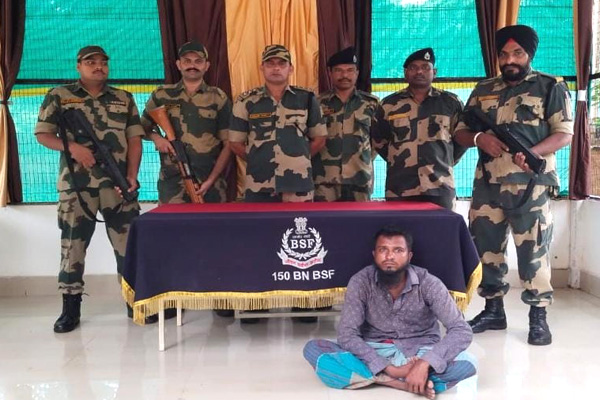The Border Security Force (BSF) detained 65 Bangladeshi nationals in September along the Tripura border. The arrests included three individuals from the Sepahijala district, who were apprehended earlier this week. This surge in detentions reflects the increased vigilance of the BSF along the India-Bangladesh border in the northeastern state.
The BSF has consistently worked to curb illegal crossings and enhance security in Tripura, which shares a long and porous border with Bangladesh. In September, the BSF heightened its surveillance and border patrol operations, leading to the detention of these 65 individuals. The detained Bangladeshis were found to be crossing the border into India without valid documentation, a growing issue that continues to raise concerns about security and border control.
The three individuals detained from the Sepahijala district were discovered during a routine patrol. The BSF, acting on intelligence inputs, intercepted the group attempting to cross into Indian territory. The detained individuals were taken into custody and handed over to local authorities for further investigation. This particular incident has drawn attention to the continuing challenges faced by border security forces in managing illegal immigration and maintaining border integrity.
BSF officials have emphasized the need for stricter measures to prevent such crossings. They attribute the rising number of illegal entries to the vast and challenging terrain of the border region. Tripura’s border with Bangladesh is lined with thick forests, rivers, and hilly areas, making it difficult for security forces to monitor all points of entry effectively. Despite these difficulties, the BSF has been working to strengthen its presence and intensify its patrols in vulnerable areas.
The detained Bangladeshi nationals were mostly found to be entering India in search of better economic opportunities. Many of them have been driven by poverty and unemployment in Bangladesh, leading them to cross the border illegally in hopes of finding work in India. This situation has long been a problem for both countries, with illegal immigration creating additional challenges for local law enforcement agencies and border security personnel.
The BSF’s increased efforts to detain illegal immigrants aim to maintain security and uphold the integrity of the international border. The BSF has implemented several measures, including the use of advanced surveillance equipment and drone technology, to monitor the border more effectively. These initiatives have contributed to the rise in detentions, as security forces have become better equipped to detect illegal crossings.
The detentions in September are part of a broader trend of increased border activity in the northeastern states. Tripura, due to its geographical proximity to Bangladesh, has been a hotspot for illegal immigration. Over the years, the state has seen a steady influx of Bangladeshi nationals entering the country without proper documentation. This issue has prompted the BSF and local authorities to take more aggressive steps to address the problem.
The detained individuals, after being taken into custody, will go through the legal process, which often involves being repatriated to Bangladesh. This process can take time, as it requires coordination between the Indian and Bangladeshi governments. However, both nations have been working together to streamline the process and ensure that individuals crossing the border illegally are dealt with in accordance with the law.
The Tripura government has also voiced its concern over the issue of illegal immigration, urging the BSF and other security agencies to continue their efforts to secure the border. The state government has emphasized the need for greater cooperation between the Indian and Bangladeshi authorities to prevent illegal crossings and manage the flow of migrants more effectively.
In response to the rising number of detentions, the BSF has reiterated its commitment to maintaining a secure and impenetrable border. Officials have called for continued vigilance and collaboration between various security agencies to tackle the issue of illegal immigration. They have also highlighted the importance of addressing the root causes of the problem, such as poverty and unemployment in Bangladesh, which drive many individuals to cross the border in search of a better life.
As the BSF continues its operations along the Tripura-Bangladesh border, the focus remains on ensuring that the region is protected from illegal activities while upholding the principles of humanitarian law. The 65 detentions in September serve as a reminder of the ongoing challenges faced by border security forces, and the need for continued efforts to address this complex issue.


